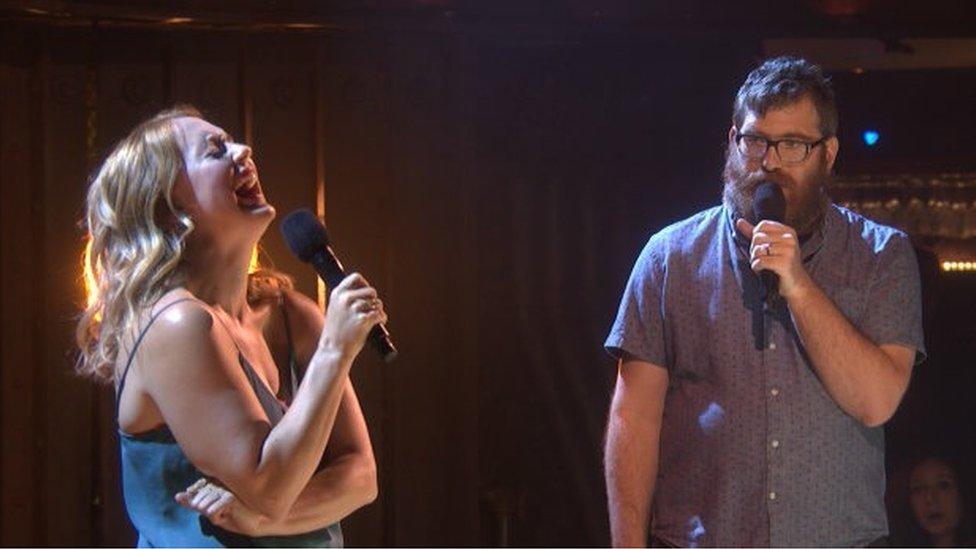Real-life trolling: When a 'roast' becomes harassment
- Published

Marquel Carter, known as PlainPotatoees, has been filming himself insulting people on the streets
The US tradition of a "comedy roast" involves trading insults for laughs. But when people try to recreate them online, they can get it badly wrong and even break laws. Here's how.
When a Twitter user going by the name of PlainPotatoess referred to himself as a comedian in his bio, even he used inverted commas.
The people he encountered on the streets of Baltimore certainly did not find him funny.
The 20-year-old, whose real name is Marquel Carter, is now facing multiple police charges and possible jail time.
He had been roaming the city for months, with a smartphone in hand, insulting people. His shtick involved picking a random target - often staff or patrons in restaurants - and then pointing a camera in their face, while bombarding them with comments, often related to their appearance or race. His actions ranged from the annoying (telling people their breath smells) to the abusive (kissing people's faces).
The videos almost never raised a laugh in person, but online some people responded encouragingly, giving him "likes" and praising his "roast".
The police, however, recognised the severity of his actions. At the end of last week, he was charged with five counts of harassment and 16 counts of trespassing.
His Twitter and YouTube accounts have been suspended.
Speaking to the Baltimore Sun after being charged, Mr Carter has said he did not mean hurt, external or traumatise anyone, but people were being overly sensitive and couldn't take a joke.
He said he had been inspired by watching "prank videos". "The funniest ones were the ones where people get all bent out of shape. I said, 'What if there's content of people getting bent out of shape and getting upset?' That was my goal - just to get reactions out of people."
When is a roast not a roast?
The roast is a US comedy tradition that dates back to the 1950s. The most famous recent example is the televised Comedy Central Roast, which has featured a variety of big names, including Justin Bieber, Pamela Anderson and even a pre-presidency Donald Trump.
However, as diverse as the participants can be, one factor is crucial: consent. People put themselves forward, in the spirit of being a good sport.
Social media users sometimes think they can simply recreate their favourite shows, unaware of the behind-the-scenes work that goes into them, such as producers asking prank participants to sign waivers to share footage or pre-production conversations with lawyers to ensure boundaries are not overstepped.
In the Baltimore videos, people were not playing along. They implore Mr Carter to leave them alone.
"If this guy was trying to do a roast, he got it all wrong," says Brian Moses, who created the Roast Battle show for Comedy Central. "There are three parties involved in a roast - the comedian, the target and the audience, and everyone has to be on board."

Roast Battle participants put themselves forward
His Roast Battle involves two comedians going head-to-head in front of a crowd at the Comedy Store in Hollywood. Prospective participants are told they must have seen the show before, and they must find their own opponent. "The two of them are often friends," says Mr Moses. "And that makes a better show, because people can go beyond surface insults and they also know where not to go."

Donald Trump had some rules when he was roasted in 2011
Because even when the ensuing blows seem low, boundary negotiations have often gone behind the scenes. Mr Moses explains: "Someone might say, 'You can mention my dead dad, but you can't mention my acne'."
When Donald Trump was roasted in 2011, he reportedly told the hosts jokes about his fortune were off limits. The comedians later said they had agreed not to imply he was as rich as he said he was.
'Please #roastme'
The online forum Reddit has long had a public "roasting" thread, where people post selfies with a sign saying "roast me" and then wait for the jibes to flow. Participants have said they do it because they want attention.
Matthew Johnson, director of education at MediaSmarts Canada's Centre for Digital and Media Literacy, has previously voiced concerns about online roasting merging into cyberbullying, external.
He tells the BBC he is not entirely surprised by the Baltimore case, though it is extreme.
"We know that young people - boys in particular - are frequently able to rationalise behaviour by calling it a joke," he says.
He refers to the problem of the "empathy trap" in digital media. "The normal cues aren't present. In the real world, you normally read a friend's facial expressions and body language, and if you see they are upset, you back off."
The other problem, says Mr Johnson, is that YouTube's algorithms reward more outlandish content.
Inside the weird world of YouTuber burnout
"Whatever the genre, makers are pushed to make more extreme content to get more attention. Even on Pinterest food boards, people are being pushing towards more and more elaborate stunt food."
He points out how the top-name YouTube provocateurs - including Pewdiepie and Logan Paul - have got in trouble in various ways in recent years for overstepping boundaries. "And if you are trying to be noticed against the big names, you may go even further."
However, despite the "empathy trap", he says young people are typically more persuadable by moral concerns than by the threat of punishment.
But what does the law say?
Local councillor Eric Costello asked the police to investigate Mr Carter's videos after dealing with dozens of constituents' complaints about them. "I watched them and saw people telling him to leave multiple times. Then when they call the police, he does a skit with the police. It is wasting resources - and we don't have resources to waste in this city," he says.
Baltimore criminal defence lawyer Randolph Rice says you fall in to the territory of harassment or trespassing when you fail to heed warnings.
"If you have notice from someone who says 'You are bothering me, stop' and yet you continue, that is when it becomes a problem," he says. "That even applies to a public place - where there is less of expectation of privacy."
Local media says two petitions for peace orders were filed against Mr Carter, including one from a cafe owner in the Mount Vernon area in the city's north.
"If the owner or an agent of an owner - which can be the manager, or a security guard - asks you to leave, and you don't, that can lead to a charge of trespassing," says Mr Rice.
These laws are usually applied more in domestic situations, between couples for example, he adds.
"What is so bad [about Mr Carter's case] is that he has video evidence that can be used against him."
- Published29 April 2018

- Published10 January 2019

- Published28 May 2018
